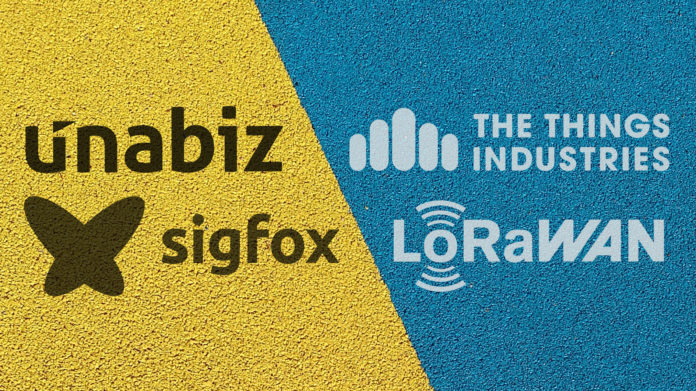Sigfox-parent UnaBiz and LoRaWAN group The Things Industries (TTI) – two companies that appear to be culturally aligned, albeit differently rooted in IoT; which appear to speak the same language, albeit from different sides of the low-power wide-area (LPWA) divide – have struck a deal to work together. It brings Unabiz’s vision about a so-called ‘unified LPWAN world’, to vanish different connectivity tech into an any-way-that-works IoT solution, a step closer.
The deal will see Unabiz integrate The Things Stack from TTI into its UnaConnect middleware platform, used also to manage cellular IoT connectivity, to interface better with TTI-supported LoRaWAN networks. The combination of Sigfox and LoRaWAN as non-cellular LPWA technologies, plus Unabiz’s developing cellular IoT workload, supporting NB-IoT and LTE-M solutions, mean it can start to knit together hybrid IoT projects – in the cloud at least.
In reality, talk about a ‘unified LPWAN world’ only reflects what the market wants. Work to marry-together complementary short- and long-range sensing technologies is well understood. The motivation to join sibling rivals in the LPWA space has been less clear, as each side has talked about world domination; but key differences in reach, and slight differences in tech, plus a frustrated user market, has forced protagonists on both sides to plot together.
Since acquiring Sigfox a year ago, Unabiz has been vocal about hybrid LPWA IoT; The Things Industries, which provides cloud and edge LoRaWAN network servers, has always put the use-case ahead of the technology, and considered the big IoT project, nominally, as a single discipline. A statement said the integration will “allow customers who want to adopt hybrid solutions to enjoy [a] secure, reliable, and cost-efficient data aggregation service.”
The Things Industries will provide Unabiz with “direct access” to its ecosystem of 500-odd device makers and 170,000 developers worldwide. All 70 national Sigfox operators will gain access to a global LoRaWAN roaming platform – to provide a “complementary carrier-grade LoRaWAN roaming and peering infrastructure”. The deal will “deliver unparalleled IoT solutions”, the pair said, establishing a platform for “heterogeneous fleet management”.
Henri Bong, chief executive and co-founder at UnaBiz, said: “Interoperability has always been an obstacle for massive IoT… We are offering our customers the freedom to choose the best solution that fits their needs. By leveraging TTI’s global roaming platform, we enable our customers to roam and scale on both [Sigfox] and LoRaWAN.”
Wienke Giezeman, chief executive and co-founder of The Things Industries, said: “We are excited to support UnaBiz in their technology convergence strategy as their partner for LoRaWAN network management infrastructure. We are a strong believer in its vision and are happy to provide their customers with a world class LoRaWAN infrastructure.”
Writing on LinkedIn, Bong also added a personal note: “I got to know Wienke a few years back… [and] have always been impressed by his unique style – which is very different from [most] tech entrepreneurs. [Refusing] to raise funds, in order to [remain independent], [and] serving the maker and tech community without ego, stating facts instead of unrealistic figures, building [by degrees] the largest LoRaWAN ecosystem with very limited resources… [he] has demonstrated unique skills of leadership.
“We spoke for years about convergence… way before Unabiz acquired Sigfox. Today, I am proud and honoured to publicly announce our partnership. May the whole world see that technologies are just a tool to serve our common vision of an Unified LPWAN World – to unleash massive IoT. This is just the beginning… stay tuned.”
Giezeman responded: “Thanks for the kind words. [But] this is all team work; I am just the front end.” He wrote himself: “[We] UnaBiz in fulfilling the LoRaWAN part of its LPWAN convergence strategy… We are a strong believer in its vision… [and remain] relentlessly focused on our LoRaWAN network management product leadership and operational excellence globally. So partners like UnaBiz don’t have to worry a bit about LoRaWAN.”

